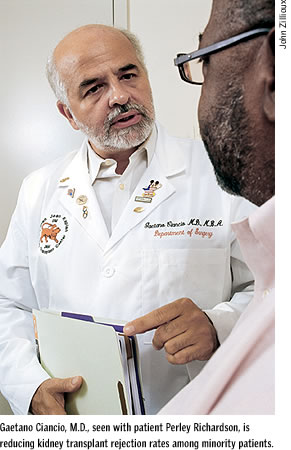 In South Florida the groups most often needing kidney transplants— African-Americans
and Hispanics—have been the least likely to donate
kidneys and the most likely to reject transplants. These
disparities often prove detrimental, even deadly, for patients,
says Gaetano Ciancio, M.D., associate director of the Division
of Transplantation and director of transplant education
and research for minority groups. In South Florida the groups most often needing kidney transplants— African-Americans
and Hispanics—have been the least likely to donate
kidneys and the most likely to reject transplants. These
disparities often prove detrimental, even deadly, for patients,
says Gaetano Ciancio, M.D., associate director of the Division
of Transplantation and director of transplant education
and research for minority groups.
For the past ten years, Ciancio and a
group of Miller School surgeons have been working to
decrease rejection rates
while pushing to increase kidney donations among Hispanics
and African-Americans.
Ciancio says ethnic groups often have
the same fingerprint common antigens, which can protect
against chronic rejection.
That’s why it’s so important to graft an
African-American kidney into an African-American patient.
By closely matching the DNA, doctors are reducing the
risk of rejection.
When Ciancio began rotations in 1993,
he focused much of his work on African-American and Hispanic
patients. The
task was daunting. Few matches could be found, and rejection
rates soared to 20 to 30 percent.
He has helped to reduce those numbers
significantly. The key, he found, is to use a group of
agents that help reduce
the chance of rejection. These include daclizumab, mycophenolate
mofetil, tacrolimus, and steroids.
Over the past ten years, UM doctors have
used these and other agents to helpmore than 3,000 kidney
transplant
recipients. Rejections steadily diminished. “Now
they are in single digits, maybe 8 to 9 percent,” Ciancio
says.
Thirty-year-old O.T. Patrick Jr. received
a transplant in 2003 from Ciancio after living with kidney
failure for
more than a year. He has had type 1 diabetes since age
7 and admits he did not present himself as an ideal patient
in the beginning.
“I had a terrible attitude,” Patrick
recalls. “Dr.
Ciancio sat down with me andbroke it down for me piece
by piece.”
The transplant went very smoothly, and
Patrick said he felt better in just a few days. “I had much more
energy, my appetite came back.”
Perley Richardson, 50, has been living
successfully with a transplant for 11 years. “Before that, I had been
on dialysis for one year,” he says. “It was
hard to breathe, hard to sleep.”
The side effects of the medication are
minimal. “It’s
better than dialysis,”Richardson says.
Cost is often a factor. The average monthly
cost for the anti-rejection medications is $3,000, and
many
of the patients
are uninsured. Ciancio works hard to convince drug companies
to supply the meds to patients at no cost. So far, his
tenacity is working, and it’s uniting the community.
Ciancio has appeared on TV and radio to
talk about the subject, and the community honored him
with the Dr. Martin
Luther King Junior Spirit Awardin 2002.
But his work is just beginning. Ciancio
hopes to create a University chair to continue his research
and says he
has no plans to change the focus or location of his work.
“I will stop only when access is the same among all
ethnic groups,” he says. “Until the disparity
is no longer there, I will be there.”
|